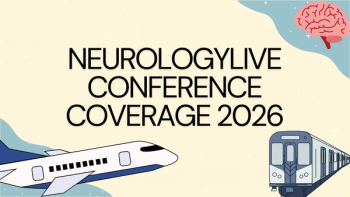
A recent analysis reveals fenfluramine's positive effects on executive functioning in adults with Lennox-Gastaut syndrome, independent of seizure reduction.

A recent analysis reveals fenfluramine's positive effects on executive functioning in adults with Lennox-Gastaut syndrome, independent of seizure reduction.

The director of the EEG/Epilepsy Unit in the Department of Clinical Neurosciences at Lausanne University Hospital in Switzerland discussed post-anoxic seizure management at 2025 AES Annual Meeting. [WATCH TIME: 3 minutes]

The staff neurologist at the Mellen Center for Multiple Sclerosis at Cleveland Clinic shared data from the phase 2 CALIPER trial of vidofludimus calcium in progressive MS presented at ECTRIMS 2025. [WATCH TIME: 7 minutes]

Follow NeurologyLive's conference journey in 2026, highlighting advancements in diagnostics, treatments, and multidisciplinary care across multiple neurological conditions.

Fenfluramine shows significant seizure reduction in CDKL5 deficiency disorder, offering hope for families facing treatment-resistant epilepsy challenges.

A pair of pediatric epileptologists highlight the systemic and patient level factors driving inequities in infantile epileptic spasms syndrome care and outline paths toward more equitable diagnosis and treatment.

Final safety data from an open-label study presented at AES 2025 supported long-term fenfluramine use in pediatric and adult patients with Dravet syndrome or Lennox-Gastaut syndrome.

An AES study revealed the real-world persistence of fenfluramine in treating Lennox-Gastaut syndrome, highlighting patient demographics and treatment trends.

A neurologist at St Vincent's Hospital shared recently presented findings from a phase 2 study of tazbentetol, a novel synaptogenic small molecule, in mild-to-moderate Alzheimer disease. [WATCH TIME: 4 minutes]

A recent trial reveals semaglutide's potential for neurological improvement in stroke patients, despite no overall functional recovery benefits.

The Baldwin Keyes Professor of Neurology at the Sidney Kimmel Medical College at Thomas Jefferson University and Founder’s Award recipient discussed the state of the epilepsy care community and his outlook for the future. [WATCH TIME: 4 minutes]

The assistant professor at the University of Southern California discussed how intentional, community-centered recruitment strategies can improve diversity, trust, and retention in neurodegenerative studies. [WATCH TIME: 6 minutes]

Catch up on any of the neurology news headlines you may have missed in December 2025, compiled into 1 place by the NeurologyLive® team.

The newly approved generic product is expected to perform like other high-quality glatiramer acetate generics, with differences confined mainly to the manufacturer and device, not mechanism or dosing.

A new large-scale analysis revealed that patients with identical EDSS scores can exhibit distinct patterns of functional impairment, identified using artificial intelligence–based clustering algorithms.

Here's some of what is coming soon to NeurologyLive® this week.

Janelle Wagner, PhD, a clinical psychologist and research professor at the Medical University of South Carolina, provided clinical insights on a recently presented study on whether elevated ADHD symptoms impact post epilepsy surgery seizure freedom.

Benjamin Greenberg, MD, MHS, a nationally recognized neuroimmunologist, spoke about the clinical impact of the latest NMOSD recommendations and their implications for diagnosis and care.

Test your neurology knowledge with NeurologyLive®'s weekly quiz series, featuring questions on a variety of clinical and historical neurology topics. This week's topic is on preventative migraine therapies!

ALS expert Sabrina Paganoni, MD, PhD, provided follow-up commentary on promising phase 1 data from the LUMINA trial testing Amylyx’s novel agent AMX0114 in patients with early-stage ALS.

Neurology News Network for the week ending January 3, 2025. [WATCH TIME: 4 minutes]

As part of NeurologyLive®'s Year in Review, take a look at some of the top ongoing clinical trials in Parkinson disease that may impact care.

Take 5 minutes to catch up on NeurologyLive®'s highlights from the week ending January 2, 2026.

As part of NeurologyLive®'s Year in Review, take a look at some of the top ongoing clinical trials in Alzheimer disease and dementia that may impact care.

Explore anticipated FDA decisions on groundbreaking neurology drugs in 2026, shaping treatment options for various neurologic conditions.

Margaret Rice, PhD, a professor in the Departments of Neurosurgery and Neuroscience at NYU Grossman School of Medicine, provided answers on recently published preclinical research relating aerobic exercise to dopamine release and coordination in PD.

As part of NeurologyLive®'s Year in Review, take a look at our top expert interviews on the latest advances and use of artificial intelligence in neurology care.

At ECTRIMS 2025, the William S. and Lois Stiles Edgerly Professor of Neurology at Yale School of Medicine discussed evolving insights into the disease pathogenesis of multiple sclerosis.

As part of NeurologyLive®'s Year in Review 2025, we've compiled some of the top trending migraine trials.

As part of NeurologyLive®'s Year in Review, take a look at our top collaborative interviews with the Strategic Alliance Partnership program in 2025.